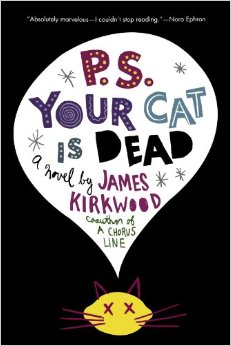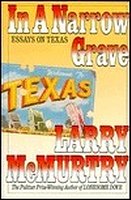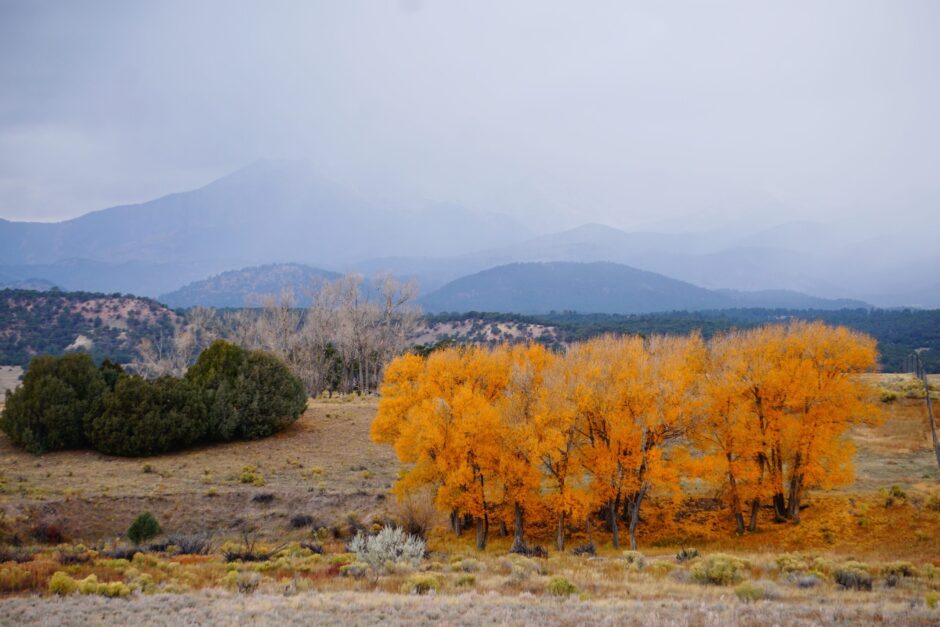So as I noted in my previous post (The Goodwill Genius: On Discovering Vladimir Nabokov’s Bend Sinister) I actually wrote the “wrong” essay for my editor at the Dallas Morning News, remembering it only to be about a book that changed my life. The idea of the prompt, however, was supposed to be about a book given as a gift—in the spirit of the Christmas holidays, natch. Once I realized my mistake, I wrote another essay, which can be found here. (I’ll also post the text of it below.) It’s all true, and involves a high school student who was expelled from school for an entire semester (that miscreant would be, um, me) befriended by a literary sailor (oddly enough, I’m pretty sure his name was Bill, my own name). In the essay I mention two books—Larry Mcmurtry’s In a Narrow Grave (1968) and James Kirkwood’s P.S. Your Cat Is Dead (1972).

Kirkwood is most famous for writing the Broadway hit A Chorus Line, but P.S. Your Cat Is Dead is actually quite fun, and was an eye-opener for a high school kid, especially one who was waiting tables at his parents’ restaurant as he waited to be allowed to return to high school (which he never really liked anyway, but was smart enough to realize that, whether you like it or not, you have to finish high school; it’s a rule). Among other things, P.S. Your Cat Is Dead features a gay burglar tied up and held hostage by a (possibly/probably) gay tenant whose apartment he was burgling.
Larry McMurtry’s In a Narrow Grave is a horse of a different color, and is obviously more appreciated by Texans or those interested in Texas culture (read: Texans). I was never a huge fan of McMurtry’s novels, but I liked the early ones the best: The Last Picture Show (1966), Leaving Cheyenne (1963), All My Friends Are Going to Be Strangers (1972). I remember the funniest essay being a kind of ethnographic analysis of Texas sexual mores and practices, including the ranch kids’ habits of bestiality. I remember thinking: Not in my neighborhood they don’t.
For the full (and short) essay, see the text below. I never saw the sailor again. I hope he never sank.

The Sailor’s Gift to the Kid
Bearded, sunburnt and gentle, his long hair in a hippy ponytail, clothes spattered with paint and sealant, every day the sailor would come into my parents’ honkytonk café for lunch, and I would take his order and chat. Our café, aptly named The Tall Tale, was off Fulton Beach Road on the Texas coast, a couple blocks from the boat basin, where he worked. He was building a trimaran sailboat with the ambitious, starry-eyed goal of sailing around the world. The year was 1974. I’d been kicked out of school that Fall (which is, as they say, another story) and had time on my hands. He was a nice guy in his twenties, adventurous and educated, with a Master’s degree in literature from the University of Texas—where I wanted to go, if they ever let me back in high school. You could say our lives were headed in different directions, his up and mine down, and we hit it off in a Luke-Skywalker-and-Yoda way. He turned me on to several books, including James Kirkwood’s “P.S.: Your Cat Is Dead,” a zany comic novel published a couple years earlier, which opened my eyes to a world of lit quite different than, say, high-school favs such as Hemingway’s “The Sun Also Rises.” Around Christmas the sailor gave me a paperback whose jacket featured an image of a cowboy boot decorated with the lone star emblem of the Texas flag, the first book I was ever to read by the author Larry McMurtry—“In a Narrow Grave: Essays on Texas.” I was already a wannabe writer but had read more books about life in New York or Paris than Texas, and McMurtry’s little gem showed me even the salt-marsh prairies beyond my back door could be as interesting as Greenwich Village or the Left Bank. One day I looked up to find the sailor gone. Just like that, his boat was finished and he sailed away. But he left a note for me to keep reading and writing, and I’ve come to think, in the odd way common enough in real life, that he made a difference in mine.—December 2016
- October 2023
- September 2023
- September 2021
- April 2020
- September 2019
- May 2019
- August 2018
- February 2018
- January 2018
- October 2017
- August 2017
- June 2017
- May 2017
- March 2017
- February 2017
- November 2016
- October 2016
- May 2016
- April 2016
- March 2016
- February 2016
- January 2016
- November 2015
- October 2015
- September 2015
- June 2015
- May 2015
- April 2015
- March 2015
- December 2014
- September 2014
- August 2014
- May 2014
- March 2014
- February 2014
- January 2014
- December 2013
- November 2013
- October 2013
- September 2013
- August 2013
- July 2013
- June 2013
- May 2013
- April 2013
- March 2013
- February 2013
- January 2013
- December 2012
- November 2012
- October 2012
- September 2012
- August 2012
- July 2012
- June 2012
- May 2012
- April 2012
- March 2012
- February 2012
- January 2012
- December 2011
- November 2011
- October 2011
- September 2011
- August 2011
- July 2011
- June 2011
- May 2011
- April 2011
- March 2011
- February 2011
- January 2011
- December 2010
- November 2010
- October 2010
- September 2010
- August 2010
- July 2010
- June 2010
- May 2010
- April 2010
- March 2010
- February 2010
- January 2010
- December 2009
- November 2009
- October 2009
- September 2009
- August 2009
- July 2009
- June 2009
- May 2009
- April 2009
- March 2009
Recent Posts
- Aliens Among Us: Probing Hillbillies and Freaking Shut-ins, How Netflix’s “Encounters” and Hulu’s “No One Will Save You” Prep Us for the Coming Alien Apocalypse, Kind of
- My Life as a Bob Odenkirk Character: On How Watching Netflix’s Black Mirror episode “Joan Is Awful” Mimicked My Experience of Watching the AMC series Lucky Hank
- “Bobcats, Bobcats, Bobcats”: Animal Life and a Tribute to “Modern Family”
- “The North Water”: This Ain’t Your Daddy’s Moby Dick
- Day 25: On David Quammen's "Spillover": Terrific Book That Foretold Our Pandemic, Kind of
Recent Comments
No comments to show.
